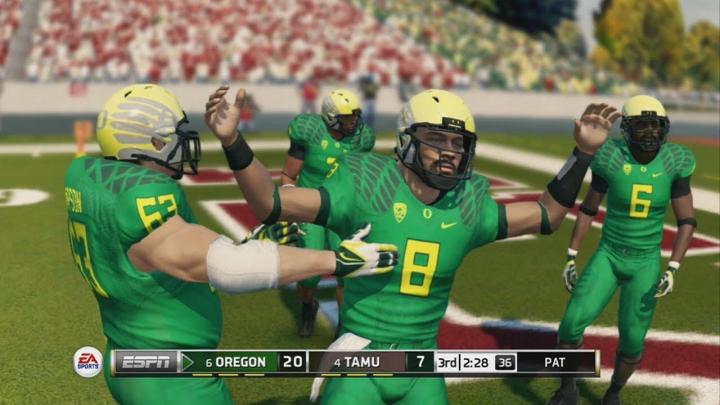
It has been a long and fraught legal road since former UCLA basketball player Ed O’Bannon first filed suit against EA Sports in 2009 for unlawfully using his likeness in the publisher’s NCAA Basketball games. O’Bannon was soon joined by former Arizona State quarterback Samuel Keller, and the case quickly spiraled into a class-action lawsuit from college athletes who felt that EA Sports and the NCAA had illegally profited from their representations.
EA has finally reached a tentative settlement agreement with the players, represented by the firm Hagens Berman Sobol Shapiro LLP.The settlement, if approved by the U.S. District Court of Northern California, will see EA shelling out nearly $1,000 per appearance to thousands of players who have appeared in the annual rosters of the NCAA Football, Basketball, and March Madness games since 2003, totaling upwards of $40 million.
The crux of the conflict lies in an NCAA policy preventing its players from profiting off of their athletic performances. While the players themselves were prohibited from receiving compensation, the NCAA, its schools, and any other companies with licensing agreements, such as EA Sports, were not, which irked players who felt exploited by the arrangement. In contrast, EA pays the NFL Players Union nearly $35 million each year to use the players’ names and likenesses in games. EA successfully claimed First Amendment protection against the initial suit, but subsequent appeals have gone in favor of the players.
The rapidly-growing group of players brought a suit against EA and the NCAA to lift the restriction and compensate for losses. Unwilling to accept the blame, the NCAA fired back in late 2013 with a suit of its own against EA for failing to provide enough liability insurance against third-party claims, and against the Collegiate Licensing Company for failing to sufficiently advise EA on the contractual obligations that it breached and for not providing the NCAA with certain documents. The NCAA essentially claims that EA and the CLC cut it out of the settlement proceedings, and wants the onus of responsibility to shift accordingly.
Despite EA, the NCAA, and the CLC showing a united front for the first few years of the players’ legal assault, the suit’s pressure was simply too much for the relationship to endure, and the licensing agreement was dissolved as of the most recent batch of 2014 NCAA games.
The settlement with the players was delayed by complications with the NCAA’s subsequent suit, but will tentatively be moving forward, pending judge’s approval. The class-action will cover any players who were included in the team roster of an NCAA-branded game from May 4, 2003 up to the preliminary approval date.


